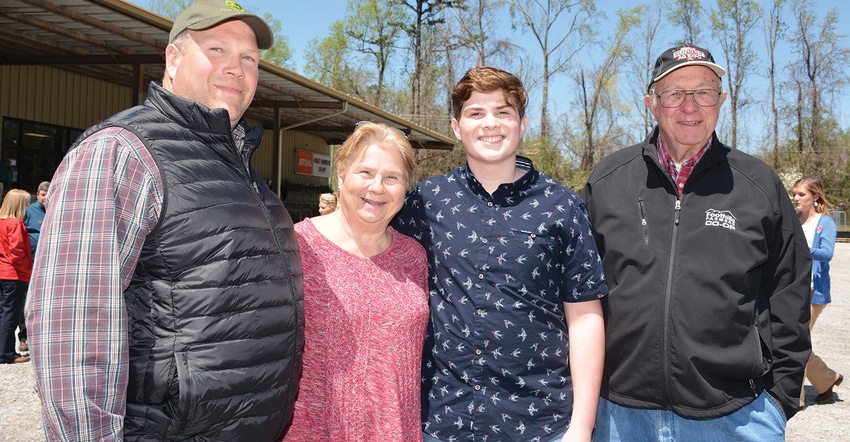
Farming land that has been in the family for 100 years comes with a deep sense of responsibility. But minding family acreage that dates back 200 years brings a sense of profound duty and reverence for the natural resources and the traditions that come down through all those generations of stewards.
John and Susan Keller, Blount County, Tenn., appreciate the legacy they have in Kelmont Farms. “John’s farm goes back 100 years,” Susan says. “My family farm has been in the family for 200 years,” she adds.
John was named Tennessee Farmer of the Year by the University of Tennessee Extension Service in 2014.
All those decades of stewardship are not lost on the Kellers, who list soil conservation as a top priority.
Susan took a few minutes to talk about the farm following a recent presentation by Secretary of Agriculture Sonny Perdue in Knoxville.
“Soil is the same to us as a palette is to an artist,” Susan says. “Without soil, we can’t produce a crop.”
Soil health
No-till production and cover crops help maintain soil heath in their corn, soybean and rye crops. “We no-till everything,” she says. “We don’t work up much ground.”
They plant rye in the fall for winter cover and for straw and plant no-till corn or soybeans into the residue. “We make a lot of hay,” she says. “We cut and bale straw.” She says the straw market is good around Knoxville and northeast and middle Tennessee.
She adds value to the straw with a table-top baler, producing miniature bales as decorative items. “We sell these miniature bales across eastern and middle Tennessee.”
She has an added-value market for corn stalks as well. “We bundle up corn stalks for fall decorations,” she says. That market, including trimmings for Halloween, has been as healthy as the Christmas decoration demand.
Beef cattle round out the diversified farm. “We have a cow/calf operation and sell feeder calves. We feed out some ourselves, about 25 a year, for individuals to buy for their freezers.”
Pellissippi Parkway
The Kellers are facing a challenge that may threaten the generations of natural resource stewardship they have inherited and sustained. A roadway, the Pellissippi Parkway, is designed to come through the farm. Susan says it’s a highway “that’s not needed and is a waste of money,” in addition to ruining farmland.
“People don’t understand agriculture,” she says. She explains that the highway route was selected to avoid residential and business interests. “They determined that only one business, an old, closed gas station, would be affected,” she says. “The rest of the area was ‘open, unimproved land.’ They don’t understand that a farm is a business,” she adds.
“People need to realize how important a farm is. Food doesn’t just appear in the stores every night.”
She says if the road followed property lines, it would be less detrimental to productive farmland. “But they say an S configuration is more efficient.” That route comes right through the farm and will damage water and groves of trees and will disrupt wildlife, she says.
“It’s sad that no one considers the importance of a farm.”
They’ve done their part to enlighten the public. For more than 20 years the Kellers have done what they could to educate people about agriculture’s contribution. At times, they’ve shown their farm to folks from kindergarteners to senior adults. “We need to tell our story,” she says.
Include legislators
The effort needs to include legislators. “The folks in D.C. need to realize that when they slap something small on agriculture it goes a long way across the food chain.”
Susan says John came back to his family farm after earning an ag degree at the University of Tennessee. “Back then, women did not go into agricultural courses,” she says. She got a degree in home economics.
Their daughter, Margaret, earned a degree in food technology from the University of Tennessee, Knoxville. and is working for Nestle in Ohio.
Their son, Sam, now 46, earned a degree in agricultural business from UT and had multiple career options. “He interviewed with several ag companies,” Susan says. She adds that she and John were talking to him about his interviews and wondering which offer he would take. “He said he had one more interview to do,” she says. “Kelmont Farms. John handed him the checkbook.” She says they were overjoyed that the next generation will carry on a long tradition of stewardship and reverence for agriculture.
About the Author(s)
You May Also Like






